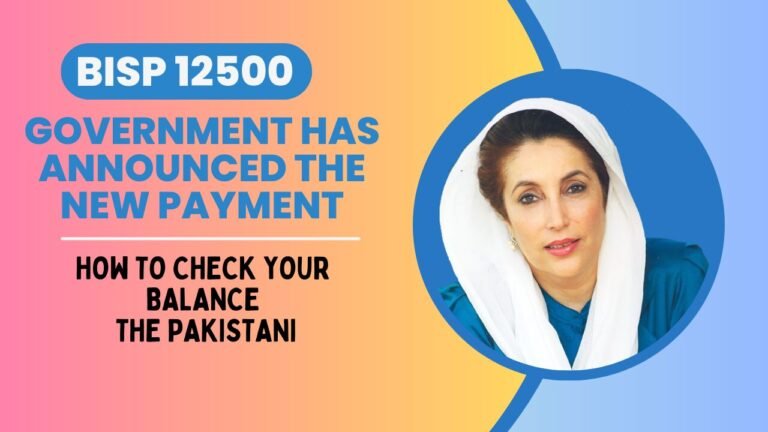Balancing the check for the Benazir Income Support Programme (BISP) payment of PKR 12,500, announced by the Government of Pakistan, is a critical task for beneficiaries. Ensuring that the payment is received and utilized effectively requires understanding the process, keeping track of transactions, and managing funds prudently. Here’s a comprehensive guide to help beneficiaries balance their BISP payments:
Understanding BISP and the New Payment Announcement
The Benazir Income Support Programme (BISP) is a social safety net initiative aimed at providing financial assistance to the most vulnerable segments of society in Pakistan. The recent government announcement of a PKR 12,500 payment is part of ongoing efforts to support low-income families. This payment is intended to help beneficiaries manage basic needs such as food, health, and education expenses.
Steps to Balance Check the BISP Payment
- Verification of Payment Receipt
- SMS Notification: Upon disbursement, beneficiaries usually receive an SMS notification on their registered mobile number. This message will confirm the amount credited to their account.
- ATM/Bank Visit: Beneficiaries can visit an ATM or their respective bank branch to check their account balance. This can be done using their BISP ATM card.
- Online Banking: Those with access to online banking can check their balance through the bank’s official website or mobile app.

- Documentation and Record-Keeping
- Transaction Slips: Always keep transaction slips or screenshots of online banking transactions. These serve as proof of payment and can be helpful in resolving any discrepancies.
- Record Book: Maintain a simple record book where all transactions, including the date and amount of the BISP payment, are noted. This helps in tracking expenses and managing the funds effectively.
- Budgeting the Payment
- Prioritize Needs: List out essential expenses such as groceries, healthcare, school fees, and utilities. Allocate funds based on priority to ensure that the most critical needs are met first.
- Monthly Budget Plan: Create a monthly budget plan. Divide the PKR 12,500 into weekly or monthly portions to avoid overspending early in the payment cycle.
- Emergency Fund: Set aside a small portion of the payment as an emergency fund. This can be crucial in handling unexpected expenses without disrupting the budget.
- Utilizing Digital Financial Tools
- Mobile Wallets: Many banks offer mobile wallet services that allow for easy tracking of expenses and balance inquiries. Beneficiaries should explore such options if they have access to a smartphone.
- Expense Tracking Apps: Various free apps can help track daily expenses and manage budgets. These apps can categorize spending and provide insights into saving opportunities.
Resolving Issues and Discrepancies
Despite best efforts, there may be instances where beneficiaries face issues such as non-receipt of payment or discrepancies in the amount credited. Here’s how to handle such situations:
- Contact BISP Helpline
- The BISP helpline is available to assist beneficiaries with any issues related to their payments. Make sure to provide your CNIC number and other relevant details when contacting the helpline.
- Helpline Number: 0800-26477
- Visit BISP Office
- If the issue is not resolved through the helpline, visit the nearest BISP office. Carry your CNIC, BISP card, and any transaction records. The staff can assist in verifying and resolving the issue.
- Bank Inquiry
- For issues related to ATM transactions or online banking, contact your bank’s customer service. Provide details of the transaction in question to get the issue addressed.
- Escalate the Matter
- If all else fails, escalate the matter to higher authorities within BISP or seek assistance from local government representatives. Document all communication and keep a record of your complaint.
Maximizing the Benefit of BISP Payments
To make the most out of the BISP payments, beneficiaries should focus on financial literacy and planning. Here are some tips to maximize the benefit:
- Financial Literacy Programs
- Participate in financial literacy programs offered by various NGOs or government initiatives. These programs can provide valuable insights into money management and savings.
- Community Support Groups
- Join community support groups where beneficiaries share experiences and tips on managing BISP payments. Such groups can also provide emotional and social support.
- Skill Development Programs
- Utilize part of the BISP payment to enroll in skill development programs. These programs can enhance employability and open up new income opportunities, reducing dependence on social support.
- Savings Plans
- Open a savings account if possible and deposit a portion of the payment regularly. Even small savings can accumulate over time and provide financial security.
Balancing the BISP payment of PKR 12,500 requires a systematic approach involving verification of payment receipt, meticulous record-keeping, prudent budgeting, and effective utilization of available financial tools. By resolving issues promptly and maximizing the benefit of the payments through financial literacy and planning, beneficiaries can ensure that the support provided by the Government of Pakistan translates into tangible improvements in their quality of life.
